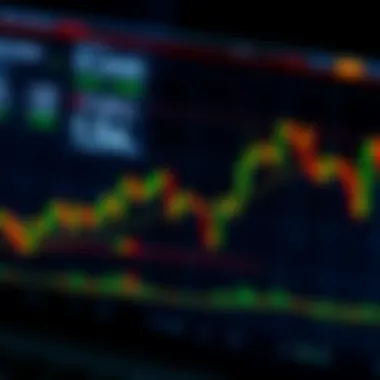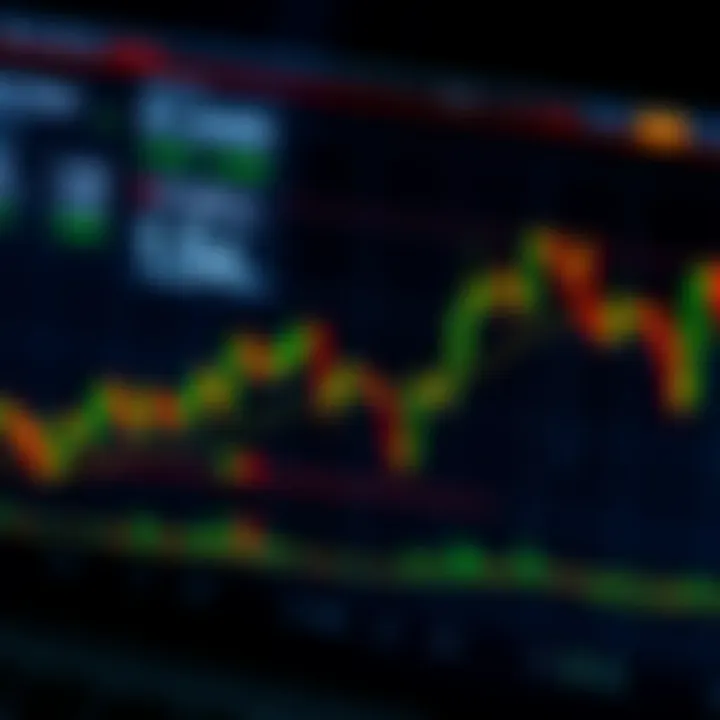Navigating Managed Forex Trading: A Comprehensive Guide


Intro
Managed forex trading represents a convergence of strategy and trust. This arena allows investors to engage in currency trading while relying on experienced managers to execute trades on their behalf. As the landscape of global finance evolves, the complexity underlying forex markets increases, creating a growing need for individuals to comprehend the intricacies of this approach.
Much like a seasoned sailor navigating turbulent waters, investors seek guidance amidst the fluctuations and volatility that define currency exchange. By understanding fundamental concepts and familiarizing themselves with effective strategies, one can better appreciate the opportunities available within managed forex trading.
In this guide, we will unpack the various dimensions of managed forex trading, from defining key terms to assessing risk management strategies. Moreover, we will delve into the mechanisms that contribute to selecting a reliable forex manager and explore the essential qualities that investors should prioritize when assessing managed forex services. Ultimately, the goal is to transform uncertainty into informed decision-making, empowering readers to venture confidently into this specialized investing realm.
Prelims to Managed Forex Trading
In today's fast-paced financial world, managed forex trading has become a prominent topic for both seasoned investors and newcomers alike. Understanding managed forex trading is essential for individuals seeking to navigate the complex waters of global finance. This section serves as a gateway into the realm of forex investments, laying the groundwork for informed decision-making.
Why is managed forex trading important? This form of trading allows investors to leverage the expertise of seasoned professionals while minimizing the burden of hands-on trading. The intricate mechanisms of the foreign exchange market can be daunting, with fluctuations driven by economic indicators, geopolitical developments, and market sentiment. By opting for managed forex trading, individuals can focus on other pursuits while their investments are actively managed by knowledgeable traders.
Furthermore, managed forex trading addresses concerns regarding time and expertise for the average investor. Not everyone has the chance—or the inclination—to pore over charts and analyze currency movements day in and day out. Managed accounts make it possible for individuals to engage in forex trading without dedicating countless hours to research and strategizing.
Defining Managed Forex Trading
Managed forex trading can be defined as a service where investors entrust their funds to a professional manager or firm, who makes trading decisions on their behalf. This model often involves the manager implementing strategies tailored to the investor's financial goals and risk tolerance. Clients benefit from the wealth of experience that professional traders bring to the table.
Key characteristics of managed forex trading include:
- Professional Oversight: Trades are executed by experts who understand market dynamics, trends, and risks.
- Customization: Strategies are often tailored to fit each client’s investment goals and risk appetite.
- Account Management: Investors can maintain a level of distance from daily market activities while still participating in the forex market.
Historical Context and Evolution
The concept of managed forex trading has evolved significantly over the years. It traces its roots back to the early stages of currency trading, where large institutions and banks primarily dominated the market. The 1980s and 1990s saw a surge in retail trading due to advancements in technology and the introduction of online trading platforms. These developments paved the way for managed forex services to emerge, catering to a new generation of investors who sought professional guidance.
During this period, numerous asset management firms recognized the demand for forex trading services. They began offering managed accounts, allowing individual investors access to expert trading without having to navigate the complexities themselves.
In the current landscape, managed forex trading continues to grow, primarily driven by:
- Technological Advancements: The rise of automated trading systems and algorithmic trading has transformed the way forex trades are executed.
- Globalization: An increasingly interconnected world has led to a more dynamic forex market, intensifying the need for professional management.
- Increased Regulation: As the industry matures, regulatory bodies ensure that managed forex trading maintains higher standards of transparency and accountability, offering additional security for investors.
Overall, managed forex trading stands as a unique opportunity for engaging with the forex market in a way that aligns with personal finance goals and resources.
Understanding the Forex Market
Understanding the forex market is a crucial step for anyone considering managed forex trading. Not only does it form the backbone of investment strategies, but it also offers insights into the dynamic environment where currencies are exchanged. While many view forex purely through the lens of currency pairings, it's much more than just a game of buying low and selling high; it encompasses multiple elements, including macroeconomic factors, geopolitical events, and even psychological trends that can sway the market. To successfully navigate this arena, you must fish out the right information and know what to pay attention to.
What is Forex Trading?
At its core, forex trading is the act of exchanging one currency for another, driven primarily by the desire to profit from shifts in exchange rates. Imagine standing in front of an international market, where each stall represents a different currency, all with prices that fluctuate throughout the day based on various factors. This market is open 24 hours a day, five days a week, spanning multiple time zones. Participants include not only retail traders but also large financial institutions, multinational corporations, central banks, and hedge funds.
Forex trading involves using currency pairs, such as EUR/USD (Euro to US Dollar). The first currency in the pair is the base currency, while the second is the quote currency. Changes in value between these pairs create the potential for profit, but they also bring inherent risks.
"In forex trading, a fraction of a cent can mean the difference between profit and loss."
Those engaged in forex trading need to monitor not just the prices, but also trends, news events, and economic indicators that can impact trading decisions. Ask any seasoned trader, and they’ll tell you that understanding how the forex market operates is half the battle.
Key Players in the Forex Market
The forex market is a vast ecosystem, populated by a range of participants, each with their own goals and activities. Here are the key players to keep an eye on:
- Central Banks: Institutions like the Federal Reserve and the European Central Bank wield substantial power over currency value due to monetary policy adjustments, interest rates decisions, and economic outlooks. Their actions can have a ripple effect across the market, altering trader sentiment.
- Financial Institutions: Commercial banks and investment firms engage in forex trading not just for their own investment purposes, but also on behalf of clients, executing large transactions that can shape market momentum.
- Hedge Funds: These entities often employ complex strategies to capitalize on market movements, frequently taking on significant positions that can influence currency trends.
- Corporations: Multinational businesses involved in international trade use the forex market to hedge against currency risk and facilitate transactions in different countries.
- Retail Traders: Individual investors who operate through brokers, they represent a smaller slice of the forex trading pie but collectively can influence movements, especially in more liquid currency pairs.
Understanding these players and their motivations is vital when considering a managed forex trading approach. Knowing who is influencing the market can help you make more informed decisions and better assess the strategies employed by your potential forex manager.
Benefits of Managed Forex Trading
Managed forex trading offers a multitude of advantages for those seeking to participate in the currency markets without directly handling their trades. Understanding these benefits is pivotal for investors who want to navigate the often-chaotic waters of forex trading effectively. From access to professional expertise to the element of time saving and risk diversification, managed forex trading enables a more structured approach to currency investment. Let’s delve deeper into these aspects.
Professional Expertise
One of the primary draws of managed forex trading is the professional expertise readily at hand. Forex trading is complex and requires a sophisticated understanding of market dynamics, which can be challenging for average investors. A managed forex service often employs seasoned traders who have honed their skills through years of experience and training.
Investing with experts means clients can benefit from strategies that have been tested in real market conditions. The knowledge these professionals bring includes an understanding of global economic factors, technical indicators, and trading psychology. In essence, clients are not just getting a service; they’re leveraging years of industry knowledge.
"Investing in managed forex trading allows you to tap into a reservoir of skills and insights that an individual trader might never acquire."
Time-Saving Aspect
The time-saving aspect of managed forex trading cannot be overstated. For many individual investors, dedicating the hours needed to study market trends, perform analyses, and place trades is impractical alongside their personal and professional commitments. Managed forex trading frees clients from these time constraints by allowing professionals to handle all trading activity on their behalf.


Clients are no longer burdened by the day-to-day monitoring of currency pairs and can instead focus on their own lives. Moreover, these professionals are often equipped with advanced trading platforms and algorithms that enable quicker and more informed decision-making. This way, investors can enjoy the benefits of forex trading without compromising their time.
Risk Diversification
In the realm of finance, the mantra "don't put all your eggs in one basket" rings especially true. Managed forex trading provides an avenue for risk diversification. Instead of concentrating resources in a single currency or a few trades, managed services enable investors to spread their risk across a variety of currency pairs and trading strategies. This diversification helps to mitigate losses that might occur in one area by balancing them out with gains in another.
Investors also have the option to choose managed accounts that align with their risk tolerance. This tailored approach can include anything from conservative strategies aimed at steady growth to more aggressive tactics targeting higher returns. As such, clients can engage in forex trading that suits their personal financial objectives while minimizing potential downsides.
In summary, the benefits of managed forex trading present a compelling case for both novice and experienced investors alike. The expertise of seasoned professionals, the significant time-saving potential, and the opportunity for effective risk diversification make this investment approach increasingly attractive.
Choosing a Managed Forex Provider
When considering entrance into managed forex trading, selecting the right provider is a crucial step. The choice of a managed forex provider can significantly influence both the performance of your investments and the overall experience you have in the forex market. With the variety of options available, navigating this landscape requires a thorough understanding of certain key features.
Assessing Track Record
One of the first things you should look at when choosing a managed forex provider is their track record. Essentially, you want to know how well the manager has performed over time. This means looking beyond just recent results and exploring the historical performance over various market conditions. Ask yourself questions like:
- How consistent are their returns?
- Have they outperformed benchmarks?
It's also wise to take a peek at their risk management practices. A provider's ability to manage drawdowns is as important as their ability to generate profits, so opting for someone with a good performance in down markets can often pay dividends.
Transparency and Communication
After narrowing down your options based on performance, consider transparency in their operations. A good provider will offer clear reporting on trades, strategy changes, and overall account performance. You might often hear "no news is good news", but in this case, lack of information can be a red flag.
Effective communication goes hand in hand with transparency. Understanding what's happening with your investments requires timely updates. Look for providers that prioritize keeping you in the loop, whether through newsletters, webinars, or regular account meetings. Ask for references and don’t hesitate to contact existing clients to get an idea of how engaged and informative the manager is.
"Transparency isn’t just nice to have; it’s a fundamental requirement in financial partnerships."
Fees and Structures
Lastly, one of the key elements to consider is the fee structure. Managed forex providers may charge a flat fee, performance fees, or a combination of both. Here are a few things to keep in mind:
- Flat Fees: Often easier to understand but they might not always align the provider's interests with yours.
- Performance Fees: These can incentivize managers to perform well, however, ensure you know the benchmarks used to determine success.
- Hidden Costs: It's crucial to dig deep to spot any potential hidden fees that might eat into your returns.
Understanding these aspects of fees not only helps clarify potential returns but also sets your expectations.
Key Risks in Managed Forex Trading
Navigating the landscape of managed forex trading comes with its own set of challenges. Understanding the key risks involved is paramount for any investor looking to commit their capital. Knowledge of these risks not only helps safeguard investments but also allows for more informed decision-making.
Market Volatility
Market volatility is the lifeblood of forex trading. Prices can swing dramatically based on economic indicators, geopolitical events, or market sentiment. When volatility spikes, so does the potential for profit, but at the same time, the risk of loss escalates. Traders must tread carefully, as fluctuations can occur within seconds. For investors in managed forex accounts, it's essential to recognize how a manager approaches this volatility.
For instance, a manager might employ strategies such as hedging to mitigate risk during turbulent times. Those with a higher risk tolerance may choose to lean into volatility, aiming for larger gains. On the other side, a conservative approach would involve capital preservation tactics. What’s essential is to ensure alignment in risk appetite between the investor and manager.
Some factors that contribute to market volatility include:
- Economic data releases (e.g., unemployment rates, consumer spending)
- Central bank announcements
- Political instability or major events (e.g., elections, wars)
- Speculative trading
"Market conditions can change like the flip of a coin; being well-prepared is the smart investor's best weapon."
Manager Performance Risk
Another inherent risk in managed forex trading is the performance of the manager. When you invest in a managed account, you're essentially putting your financial future in someone else's hands. While many forex managers boast impressive track records, past performance does not guarantee future success.
It's vital to carry out substantial due diligence on any manager before committing funds. This includes analyzing their historical performance, understanding their trading strategy, and acknowledging any changes in their approach over time.
Consider these questions when assessing manager performance:
- Have they adapted to changing market conditions?
- What risk management practices do they employ?
- How do they handle drawdowns and periods of loss?
Client testimonials can also provide insights, but it’s wise to take them with a grain of salt, as they may not always depict the full story.
Regulatory and Compliance Risks
The world of forex trading is tightly intertwined with regulatory oversight. Each jurisdiction may have its regulatory body, ensuring that forex operations comply with financial laws. For investors, the failure of a manager to adhere to these regulations can lead to catastrophic financial consequences.
Regulatory risks come into play when the forex market is faced with changes in legislation or increased scrutiny. Furthermore, there are varying degrees of investor protection based on where the trading is conducted.
A few key regulatory bodies include:


- Commodity Futures Trading Commission (CFTC) in the United States
- Financial Conduct Authority (FCA) in the United Kingdom
- European Securities and Markets Authority (ESMA)
Before entering into any agreement, investors should confirm that their chosen provider is compliant with local and international regulations. Only then can they reduce the chances of falling victim to fraud or mismanagement. Understanding these aspects is crucial to making informed and responsible investment decisions in the realm of managed forex trading.
Investment Strategies in Managed Forex Trading
Investment strategies in managed forex trading are the backbone of successful trades. Utilizing well-formed strategies is essential not only for maximizing returns but also for mitigating risks in the fast-paced world of foreign exchange. In a managed forex environment, these strategies take on additional relevance, as individual investors rely on their chosen managers to execute trades on their behalf. Understanding the intricacies of various strategies empowers investors to have informed discussions with their managers and helps in aligning their own financial goals with those of the trading team.
Technical Analysis Techniques
Technical analysis is a staple in forex trading, particularly when it comes to managed forex accounts. This method relies on historical price data and trading volumes to project future price movements. One of the most widely used tools in technical analysis is the use of charts and patterns. By identifying trends and reversals, traders can position themselves to make informed decisions based on price behavior rather than emotional responses.
Consider indicators like the Moving Average Convergence Divergence (MACD), which helps in spotting momentum shifts. Traders often look at support and resistance levels to gauge potential entry and exit points. Here’s a brief overview of key technical analysis tools:
- Moving Averages: Smooth out price data to identify trends.
- Relative Strength Index (RSI): Measures the speed and change of price movements to identify overbought or oversold conditions.
- Bollinger Bands: Help traders understand volatility and potential price action.
By blending these technical techniques, a managed forex trading strategy can become much more robust, providing predictive power based on statistical likelihood rather than mere speculation.
Fundamental Analysis Insights
While technical analysis is vital, fundamental analysis also holds significant weight in forming a comprehensive trading strategy. This approach revolves around understanding the socio-economic factors that influence currency values. Economic indicators such as Gross Domestic Product (GDP), unemployment rates, and inflation statistics play a crucial role.
Investors often find themselves looking at:
- Interest Rates: Central bank policies can lead to significant shifts in currency valuations.
- Economic Reports: Regularly released data that can provide insights into the health of an economy.
- Political Stability: Geopolitical events can create volatility and affect currency pairs sharply.
Fundamental analysis is about getting a handle on the bigger picture. By keeping tabs on these dynamics, a managed forex trading strategy can be adapted in real-time, helping to navigate abrupt price changes driven by unforeseen events.
Use of Automated Trading Systems
In recent years, automated trading systems, or algorithmic trading, have made significant inroads in managed forex trading. These systems take a set of predefined rules and execute trades based on algorithmic triggers, freeing managers from the need to monitor the markets constantly.
The advantages here are manifold:
- Speed and Efficiency: Automated systems can execute trades faster than a human trader and can handle multiple trades simultaneously.
- Emotionless Trading: Algorithms are not swayed by the psychological aspects of trading, which can improve decision-making.
- Backtesting Capabilities: Trading strategies can be tested against historical data to assess their viability before implementation.
However, it’s essential for investors to understand that relying too heavily on these systems carries its risks. Market environments can shift unexpectedly, and algorithms programmed for past conditions may not always be suitable for current or future market conditions. Thus, it's crucial to keep a close eye on the performance of these systems and adjust them as necessary.
In the ever-evolving landscape of managed forex trading, the integration of technical and fundamental analysis alongside the efficiency of automated systems can result in a well-rounded investment strategy.
By recognizing these diverse investment strategies within managed forex trading, investors can engage more effectively with their management teams to foster strategies that align with their financial aspirations.
Monitoring Managed Forex Accounts
In the dynamic realm of managed forex trading, keeping a vigilant eye on your investments is paramount. As an investor, understanding how to effectively monitor managed forex accounts can help you gauge performance, ensure alignment with your investment goals, and make informed decisions. Tracking these accounts is not merely a routine task; it’s a strategic endeavor that directly impacts your financial success.
One of the most compelling reasons to monitor managed forex accounts is to gain valuable insights into how your funds are being utilized. This involves examining the strategies deployed by your forex manager, the types of currency pairs being traded, and the overall risk exposure of the portfolio. A well-monitored account allows you to assess not just profit margins, but also how the trading strategies adapt to changing market conditions. The market is tempestuous, and being in the know about your investment's response to this volatility can spell the difference between success and failure.
Performance Tracking Tools
Performance tracking tools form the backbone of monitoring a managed forex account. These instruments help investors to transform opaque trading data into actionable insights. Among the most useful tools you might consider are:
- Trading Platforms: Platforms like MetaTrader 4 or MetaTrader 5 often come with built-in analytics to help you review performance closely.
- Automated Reporting Tools: Tools that automatically collate data and provide reports periodically can save time and allow for detailed analysis.
- Custom Dashboards: Utilizing data visualization tools can help present complex performance data in a digestible format, enabling quick assessments.
When using these tools, remember to keep a keen eye on key performance indicators (KPIs) such as:
- Return on Investment (ROI): Assess how much income your investments have generated relative to your capital.
- Drawdown Analysis: Understand the largest drop from a peak to a trough, indicating potential risks.
- Win Rates: Examine the percentage of profitable trades versus total trades to gage the efficacy of your manager's strategies.
Understanding Reports
Understanding the reports generated from managed forex accounts is as crucial as any investment strategy. These documents often include performance summaries, trade logs, and analysis of market conditions. To make the most of these reports, an investor needs to know how to read between the lines.
- Performance Reports: Typically, these will show the total return over a specified period, the monthly performance, and comparisons to relevant benchmarks.
- Trade Reports: Reviewing these allows you to identify the frequency and volume of trades executed, providing insight about the manager's trading style.
- Market Commentary: Many reports come with a section analyzing market trends that led to key decisions made by the manager. Understanding this context can give you confidence in their decisions or prompt a reconsideration of your strategy.
In short, monitoring your managed forex account through the use of effective tracking tools and comprehending reports equips you with the power to remain actively involved in your investments, ensuring they align with your long-term goals. By doing so, you're not just a passive observer; you're an informed participant in your financial journey.
Invest wisely, stay informed, and embrace the complexities of managed forex trading to pave the way for informed decisions.
For more resources on forex trading, consider checking:
Investopedia on Forex
Wikipedia on Forex Market
Forex Factory
DailyFX Insights
Regulatory Framework for Managed Forex Trading
The landscape of managed Forex trading is not just a marketplace of strategic investments—it operates within a vital regulatory framework that ensures transparency and fairness. This framework plays an instrumental role for investors, safeguarding their interests while fostering a stable trading environment. Understanding the regulatory dynamics helps investors navigate through potential pitfalls, helps them to make more informed decisions, and ultimately bolsters trust in the system.


Key Regulatory Bodies
A variety of regulatory bodies influence the managed Forex trading environment globally. Each body has unique responsibilities, goals, and guidelines, underlining the varying approaches to regulation. Here are few crucial organizations:
- Commodity Futures Trading Commission (CFTC): This body oversees the U.S. markets, aiming to protect investors from fraud and manipulation. Their regulations help to maintain market integrity.
- Financial Conduct Authority (FCA): Based in the UK, the FCA is renowned for its strict standards. They ensure that service providers adhere to high operational and ethical standards.
- National Futures Association (NFA): Also overseeing the U.S. markets, the NFA plays a critical role in regulating Forex trading by creating and enforcing rules for all members, ensuring that firms use best practices.
These organizations establish a protective barrier for traders, while also ensuring that managed Forex providers follow strict guidelines and policies. This enhances the overall safety of investing through managed accounts.
Compliance Requirements
Navigating through managed Forex trading necessitates understanding the compliance requirements that regulated bodies impose on Forex brokers and managers. Compliance serves as a safety net and tends to ward off stitching problems that may arise. Here are some key compliance requirements:
- Registration: All Forex managers and brokers must be registered with a recognized regulatory body, ensuring they operate legally and ethically.
- Reporting Standards: Regular reporting on financial performance and operations is required. This transparency allows investors to track performance and assess risks.
- Audit Processes: Many regulatory bodies enforce audits to verify adherence to regulations. These audits act as a check on performance and operational integrity.
- Client Protection Protocols: Rules often include provisions to protect clients' funds, such as segregating client accounts from the firm's operational funds, minimizing fraud risks.
"Investors are more likely to engage in managed Forex trading when they understand the regulatory landscape, which enhances their confidence in the safety and integrity of their investments."
In summary, the regulatory framework is paramount in managed Forex trading, ensuring that investors are protected and empowering them to engage confidently in the Forex market. Understanding the key regulatory bodies and compliance requirements enables traders and investors to make informed decisions, bringing clarity to the potentially confusing world of Forex trading.
Common Myths About Managed Forex Trading
Managed Forex trading is often shrouded in myths and misconceptions, which can misguide investors looking to enter this dynamic market. Understanding these common myths is essential as they can directly impact decision-making and investment outcomes. This section aims to clarify prevalent beliefs surrounding managed Forex trading, dispelling fears and fostering informed choices among individual investors and financial enthusiasts alike.
Debunking Misconceptions
One of the primary misconceptions that circles managed Forex trading is the notion that it guarantees profits without any associated risks. In reality, while a competent forex manager can mitigate some risks through strategic approaches, there’s no magic formula that assures returns.
- Inherent Market Risks: Let’s face it, the Forex market is a volatile beast. Prices can swing like a pendulum based on economic news, geopolitical events, and overall market sentiment. Seasoned traders understand that even the best strategies can fail to deliver consistent profits due to these unpredictable factors.
- All Managers are Not Equal: Another myth is that all managed Forex providers leverage the same expertise. Investors might assume that if one manager is successful, then all must be. This thinking fails to account for the vast differences in trading strategies, experience levels, and risk management protocols among providers. It's vital to research and assess each manager's track record individually.
- Lack of Control: Another widespread belief is that by entrusting funds to a managed Forex account, investors lose complete control over their money. While it’s true that the manager makes trading decisions, investors typically retain the ability to set parameters or guidelines for their investments. Communication remains key; don’t hesitate to discuss your comfort levels with your manager.
"Assumptions can be as misleading as a mirage in the desert."
Reality of Returns
When discussing returns, many potential investors hold unrealistic expectations fostered by myths. Yes, managed Forex trading can yield fruitful outcomes, yet not every month will produce soaring profits. Understanding what realistic returns look like is critical.
- Normalized Returns: Historically, many successful forex managers generate annual returns in the range of 10% to 30%. However, it’s essential to note that these figures can fluctuate widely based on market conditions and other factors. Three years of great returns don’t ensure the next year will follow suit.
- The Cost of Doing Business: Managed accounts often come with fees that can affect the overall return on investment. While you’re paying for expertise, it’s crucial to understand how these costs can eat into profits. Be sure to analyze fee structures before you jump in — do the potential returns outweigh the costs?
- Market Conditions Matter: The performance of managed Forex accounts can also be susceptible to macroeconomic indicators and global crises. For instance, an economic downturn might affect results negatively, even for skilled managers.
Future Trends in Managed Forex Trading
As we look ahead, the landscape of managed forex trading is evolving at a rapid pace. The convergence of technology and finance is reshaping how trades are executed and how investors approach their portfolios. Understanding these future trends is crucial because they can influence investment strategies, risk management, and even the overall effectiveness of managed forex services.
Advancements in Technology
Technology plays a pivotal role in the transformation of managed forex trading. The introduction of sophisticated trading algorithms and artificial intelligence is enabling forex managers to analyze vast quantities of data in real time. This advancement does not just enhance speed but also improves accuracy in decision-making, leading to better trade execution.
- Algorithmic Trading: Using algorithms, managers can trade more efficiently, taking advantage of minute price shifts and reacting faster than human counterparts.
- Artificial Intelligence: AI tools assess market conditions, predict trends, and refine trading strategies, providing insights that would be overwhelming for human analysis alone.
- Blockchain Technology: The transparency and security of blockchain can enhance trust and compliance in managed forex operations, ensuring a more robust trading environment.
With these technologies, not only is the trading experience becoming smoother but also more secure. Investors can have more faith in the management of their funds due to improved compliance protocols backed by technology.
"The integration of technology into forex trading is not a mere trend; it is the foundation upon which the future of trading will be built."
Growing Global Market Implications
Amidst these technological advancements, the forex market is experiencing a global expansion. No longer is forex trading confined to the developed markets; emerging economies are stepping up to play a significant role in this arena. This diversification can have profound implications for managed forex trading.
- Increased Participation: More investors from various countries are interested, which can lead to higher liquidity and more volatility, depending on economic conditions.
- New Partnerships: Forex managers may seek out local partnerships in these emerging markets, tapping into unique local insights and trading strategies.
- Regulatory Changes: As markets grow, so does the need for comprehensive regulatory measures. Understanding the complexities of international regulations will be essential for managed forex providers to remain compliant.
In light of these global trends, managed forex trading not only becomes a more expansive field but also one that necessitates adaptability from all participants involved, emphasizing the importance of staying informed and prepared for what lies ahead.
Finale
In the realm of managed forex trading, the conclusion serves as an essential anchor, summarizing intricate aspects encountered throughout this journey. Managed forex trading isn’t just a high-stakes venture; it’s an avenue for growth, guidance, and potential wealth creation. Investors who carefully consider the various elements and implications discussed in this guide can position themselves for success.
One significant takeaway is the emphasis on professional expertise. Engaging with skilled managers who understand market nuances offers a safety net against the inherent volatility of forex markets. Moreover, the time-saving aspect of relying on professionals ensures that investors can focus on their core responsibilities without the need for constant market monitoring. With the ability to diversify risks, investors can mitigate potential losses, transforming their approach from mere gambling to strategic investment.
It's also crucial to highlight the necessity of due diligence when selecting a managed forex provider. As discussed, a meticulous assessment of managers' performance, transparent communication, and a clear understanding of fee structures radically impacts the effectiveness of one's investment. These factors cumulatively build a solid groundwork for any investor entering the managed forex scenes, ensuring they're not just passing through, but thriving.
"The cautious investor is wise; in the world of forex, knowledge is often the greatest asset."
In retrospect, this article distills valuable insights while emphasizing the beneficial facets of managed forex trading. It conveys that while the road may have its bumps, with the right preparation and knowledge, one can navigate the complexities with confidence and clarity.
Summary of Key Points
- Understanding Managed Forex Trading: An in-depth look at its definitions, evolution, and processes.
- Benefits: Insights on professional guidance, time-saving opportunities, and effective risk diversification.
- Choosing Providers: How to assess performance and transparency within provider structures.
- Risk Management: Awareness of market volatility, performance risks, and regulatory concerns.
- Investment Strategies: Techniques for analysis and the role of technology in trading systems.
- Regulatory Framework: Key regulatory bodies and compliance requirements to consider.
- Debunking Myths: Addressing common misconceptions regarding returns and strategies.
- Future Outlook: Exploration of technological advancements and market growth.
Final Thoughts
In closing, embarking on managed forex trading can serve as an appealing pathway for those wishing to enhance their financial portfolio. The insights shared within this article aim to empower investors with a foundational understanding, enabling informed decisions. As the market evolves, staying attuned to trends and regulatory updates will be paramount for sustained success. The journey may be intricate and challenging, yet with proper guidance, it can also be rewarding.
As you consider entering or expanding your involvement in this bustling market, keep in mind the focus on education, strategic planning, and prudent risk management. The future of managed forex trading is not just about navigating the waves but mastering them.



